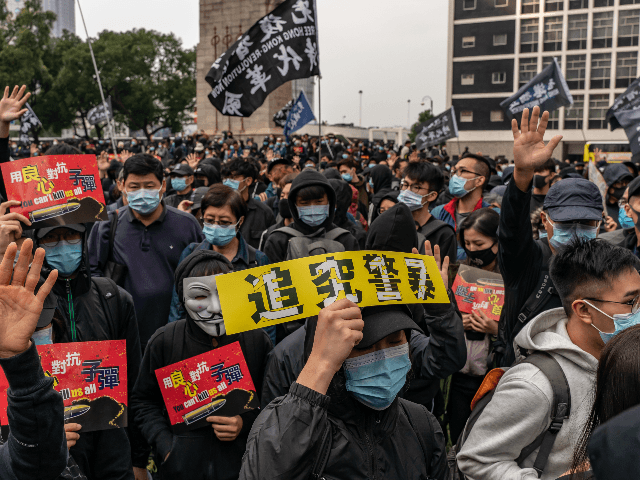The government of Hong Kong announced on Tuesday that it has urged the city’s Legislative Council to adopt a law criminalizing insults against the national anthem of China, the “March of the Volunteers,” as soon as possible.
The Legislative Council (LegCo) first entertained the bill – which would prescribe as many as three years in prison or HK$50,000 (US$6,450) to individuals found to disrespect the Chinese anthem – in January 2019, following several events in which pro-democracy sports fans booed the anthem, and some incidents of politicians and activists refusing to accept the Communist Party hymn as their own. The bill was wildly unpopular in the city.
“It’s a total subversion of our legal concept since it violates the right to keep silent,” lawmaker Eddie Chu Hoi-dik said in January. “Not only can’t you deliberately insult the national anthem, even if you do nothing, it’s an offense. It’s the new political logic of active patriotism.”
The bill also criminalizes using the anthem for commercial purposes.
The proposed law was eclipsed by another bill that would have allowed China to extradite anyone present in Hong Kong if accused of violating communist laws. Opponents contended that such a bill would have meant that all Communist Party laws were enforceable in Hong Kong, violating the Basic Law, the ruling legislation that keeps Hong Kong autonomous from Beijing. The extradition bill set of a chain of protests attracting millions of people last year until the Hong Kong government formally withdrew it from consideration.
The protests have continued to this day, demanding not just an end to laws erasing Hong Kong’s democratic norms but investigations into police brutality, freedom for imprisoned protesters, and direct election of all lawmakers. The protest movement began in June 2019, in part an offshoot of a massive ceremony honoring the dead on the 30th anniversary of the Tiananmen Square massacre in Beijing.
Now, Hong Kong’s executive government wants to ensure that disrespecting the “March of the Volunteers” is illegal before the anniversary approaches once again.
The Hong Kong government, through a spokesman, issued a statement noting that the bill would be a Hong Kong analog to already existing Chinese law criminalizing essentially all criticism of the Communist Party. That law also makes it illegal not to properly honor the national anthem, as dictated by communist authorities.
Hong Kong has implemented similar laws about the Communist Party flag. In December, police sentenced a 13-year-old girl to probation after burning the Communist Chinese flag, creating a permanent criminal record for the teen.
“The legislative principle of the National Anthem Bill is clear, that is to fully reflect the legislative purpose and intent of the National Anthem Law, a national law, which is to preserve the dignity of the national anthem and promote respect for the national anthem,” a Hong Kong spokesman said, “And at the same time to give due regard to Hong Kong’s common law system as well as the actual circumstances in Hong Kong.”
“We hope that the LegCo can pass the Bill as soon as possible,” the spokesman insisted.
The official Hong Kong government statement also denied that the law would result in “suppressing the freedom of speech,” but did not explain how this is the case.
LegCo will begin its official lawmaking session on May 27, giving its members about a week to pass the law before the Tiananmen Square massacre anniversary. Hong Kong’s government has made the national anthem law the first to be discussed on the docket that day. As the bill has been in circulation for months, legal provisions would require the bill to expire by July, when the current legislative session ends.
The government of Chief Executive Carrie Lam took over the legislative agenda through her proxy, legislator Starry Lee, last week amid scuffles in a LegCo session in which Lee declared herself the chair of the House Committee, the organization that sets the agenda. Pro-democracy lawmakers argued that it was not legal for Lee to take the chairmanship and attempted, unsuccessfully, to take physical control of the agenda.
Lam was the object of widespread protests on Wednesday on the occasion of her birthday. After a weekend in which over 200 people were arrested for participating in peaceful protests, supporters of democracy flooded several malls again on Wednesday singing “Glory to Hong Kong,” the unofficial anthem of the freedom movement, and a modified version of the birthday song for Lam, rewritten as “Happy Birthday, Fuck You.”
Protests ceased for some months in the first half of 2020 as a result of the Chinese coronavirus pandemic, which resulted in the city passing ordinances banning large gatherings and disregarding its own law that had made wearing masks in public illegal. Last week, as Hong Kong began lifting coronavirus restrictions and infections dropped to increasingly lower rates, Chinese state media urged the Hong Kong government to take more dramatic steps to prevent pro-democracy voices to express themselves in the city, calling the protesters themselves a “virus” that “must be eliminated.”
Protests are growing as the anniversary of the movement, and the 31st of the Tiananmen Square massacre, approach. The Tiananmen anniversary typically attracts thousands to a vigil for the victims of the communist killings. Last year, as discontent with Beijing grew, 180,000 people flooded Hong Kong’s Victoria Park for a vigil to honor the dead. That year, China’s defense minister defended the killings – an unprecedented move, as Beijing typically opts for denying they ever happened – as a “correct policy.”
Due to Communist Party secrecy, it is unclear how many people died in the Tiananmen Square massacre of 1989, prompted by peaceful calls for democracy. Reports indicate that the Chinese police used tanks to bulldoze protesters and shot indiscriminately at them with the intent of killing as many as possible. Some reports suggest that Chinese soldiers flooded the hospitals treating the wounded to ensure that they did not recover.

COMMENTS
Please let us know if you're having issues with commenting.